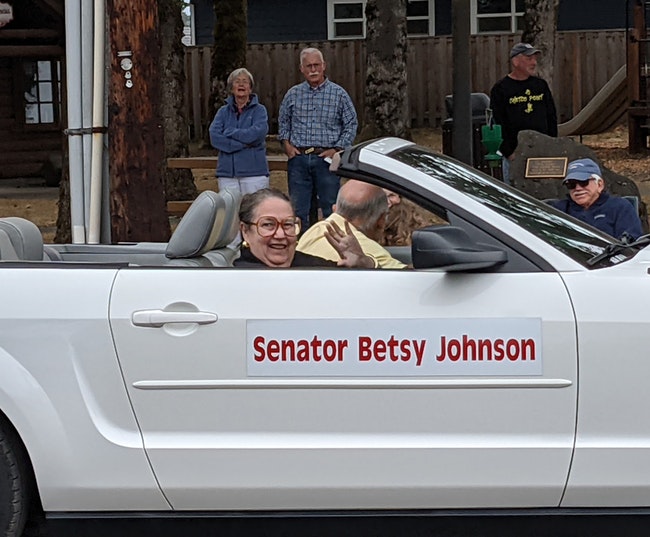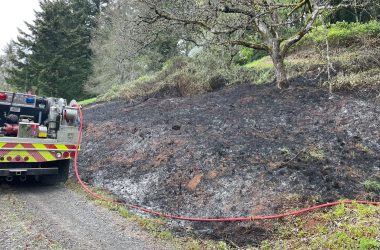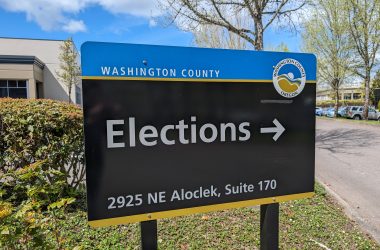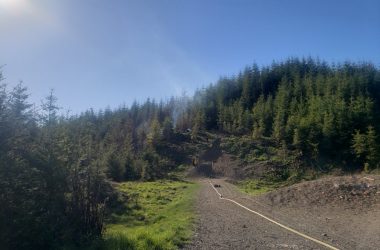Long-time Scappoose lawmaker and former Oregon senator Betsy Johnson, running for Oregon governor as an unaffiliated candidate, recently stopped in at Hop Cycle Brewing in Banks for one of her “Beers with Betsy” events where she talked with residents and local elected officials, about a wide variety of issues.
Johnson has been holding Beers with Betsy events all throughout the state since the beginning of June, including in Salem at McMenamins Boon’s Treasury, Common Block Brewing in Medford, Canby Asparagus Farm, and Casa de Tamales in Milwaukie, and she said she knows that people in western Washington County want change and that they want leaders to do what is required to make that change occur.
There were about 75 people at Hop Cycle Brewing, and Johnson described the event as “down-home democracy, with a capital D where people signed some petitions, ate some great food, talked about how to solve issues, and really did democracy.”
“I had a great conversation with a bunch of people concerned about the direction their state is heading and want big, bold change and I have a 20-year track record in the legislature and a reputation in the Senate of being very direct and forthright with people, even when it requires answers they don’t want to hear,” Johnson said.
Johnson later spoke to the Banks Post about issues of interest to western Washington County voters. The conversation has been edited for clarity.
BP: You’ve been a staunch supporter of the Second Amendment. There have been about 350 mass shootings in the U.S. just this year. How do you balance the right to bear arms with common sense legislation? What does that mean?
BJ: I have been a gun collector and a supporter of the Second Amendment. Recently I have changed my opinion. We have reduced this gun debate to gun versus no gun. Christine Drazan is silent on the issue. Tina Kotek would take guns away from responsible gun owners. That’s not where I am. I believe this issue needs true leadership.
I have modified my thinking. We need higher age limits on certain kinds of weapons, and much more aggressive background checks. For instance, the Fourth of July shooting (in Highland Park, Ill.). There were all kinds of warning signals we missed. We’ve missed a lot of stuff. Responsible gun owners can trust me to broker middle ground and I believe law enforcement would trust me to broker middle ground, and I have offered myself up to thread the needle between law-abiding citizens and keeping the guns away from criminals and kids.
The other piece that goes with that is fortifying our schools where the state provides the type of technology or public improvement that is appropriate in each community. The last piece I would say we must – must – put more mental health professionals into our schools, and into our community settings, particularly in rural settings where people have not had the density of choices on mental health providers. All of these elements need to go together in order to find that spot between law-abiding citizens experiencing Second Amendment rights and keeping our communities safe.
Q: You said certain kinds of weapons, exactly what are you referring to?
BJ: I’m talking about high capacity … commonly referred to as assault weapons.
Q: You’ve long been a supporter of natural resource extraction. How do you balance the needs of the environment with the needs of the timber industry and other so-called blue-collar industries, and with firefighting concerns?
BJ: My district includes Tillamook County, Columbia County, Clackamas County, and western Washington County, and those are natural resource economies where people fish and log and farm. Those are the kinds of blue-collar jobs and workers that I had the privilege of representing when I was in the legislature.
As to firefighting, I believe Oregon is uniquely positioned to stop putting pollution into our air with respect to fire. That means we’re going to have to thin (forests), that means we’re going to have to have prescriptive burning and do those things that innoculate the forest against conflagration. We’re going to have to continue an Oregon tradition which is the initial attack — we get on the fire fast and early and put it out when it’s small. We in Oregon have a national reputation for fighting fire aggressively at the inception level. The fed, not so much. So we would need to use the governor’s office, and I am prepared to do this, to negotiate with our federal partners to make sure we have the right policies, the right tools, and the right number of boots on the ground to aggressively fight a fire and not wait until it gets to a certain size before we intervene.
There is a discussion about balancing the needs of firefighting and the needs of the timber industry. I have lived in Oregon my entire life and I have seen (those types of conversations) occur. There is an opportunity to bring the best ideas from everyone together to create policies that satisfy the concerns of all Oregonians.
We grow timber really, really well in this state and there are precious places that need to be protected. You do that by having a balanced board of forestry that is the board of directors at the table to talk about these policies. You don’t have boards and commissions all loaded up with people from a similar perspective. Having said that, I believe the burden of climate change should rest economically on the back of working Oregonians.
That’s the whole premise of this campaign. Instead of dictating from the legislature how Oregon ought to operate you get people to sit down and figure out what is best for the environment, for the natural resources economy, for workers, for sustainable resources on the ground, for protecting precious places, and I believe those negotiations can occur and can occur successfully.
Q: Do you believe the state forester should be appointed by the governor?[Johnson was one of three chief sponsors of Senate Bill 868 during the 2021 regular session, which would have stripped the Oregon Board of Forestry of their statutory power to appoint Oregon’s state forester and transferred that authority to the governor. The bill died in committee]
BJ: I think the state forester should be a person with experience in forest management — a person with issue-area expertise with respect to forest management and perhaps academic degrees in that position. Whether or not the state forester is gubernatorially appointed or appointed by the state forestry board there should be clear expectations regarding the criteria needed for that position and for an experienced person (to be in that position) who has a track record of forest management.
Q: Speaking of state agencies, there are numerous reports of agency directors or those at the vice executive level, and some bad actors, who are not doing everything they can to get money moving — funds already received by the state — to the departments, agencies, and organizations that were intended to have it. As governor, how will you free up these resources to help the programs they were designed to help?
BJ: In my view, we need can-do, want-to, will-do attitudes from people running state agencies and for them to hold their subordinates accountable to discharge obligations given to the agency by the legislature — like getting money out the door. The fact that it took the employment department so long to get unemployment insurances moving, that the housing (department) didn’t get landlord-tenant relief to people in a timely manner, and (the department of) forestry failed to (submit payments to counties) of $1 billion …
We need a chief executive of this state who understands that state agencies need to be managed. I don’t think enough attention has been paid to holding the agency’s feet to the fire to get them to deliver services that the Oregon Legislature and Oregonians expect them to deliver.
You used the term bad actors. There have been instances where top leadership or the level right under top leadership had very serious agendas and used rule writing and other executive branch prerogatives to try to create policy. I would be vigilant to make sure agencies are not doing that and that their rule writing processes are fair, that the rule writing committee shows a balance. Imagine a governor who said I will not sign budgets, bills, or makes appointments to boards and commissions … I am perfectly prepared to do that and to give instruction to state agencies that you have to act in the best interest of Oregonians, including timely responses. Sometimes it takes forever to get a decision out of a state agency and for developers time is money.
Q: What’s your take on the Idaho-Oregon border debate and the eight Oregon counties that elected to secede from the state?
BJ: At a very high level, the fact that eight counties or more are thinking about seceding or have voted to move from the state of Oregon that’s a pretty loud clarion call that we’re doing something wrong in Oregon. Only 18 percent of Oregonians think the state is on the right track and I don’t know who those 18 percent are because I have not run into any of them.
This whole Idaho movement is indicative of those beliefs as parts of Oregon feel as though they have not been heard. They’ve been manhandled by years of progressive democratic policies that are inserting government into their lives in ways they do not like. If I were governor, I would be paying attention to the fact that eight out of 36 Oregon counties have voted to leave the state. I think that’s a wake-up call that we are doing something really wrong.






